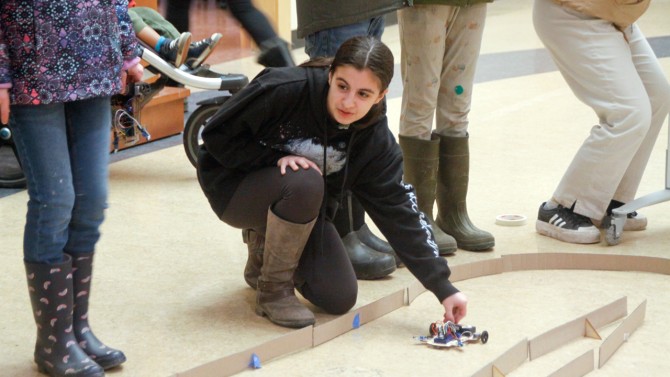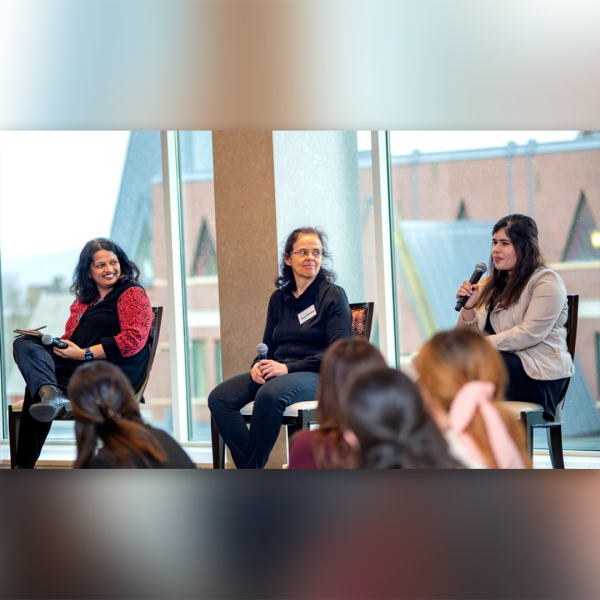April 14, 2023
By Patricia Waldron
It was the sight of two women computer science majors talking about their internships that changed everything for Jisha Kambo ’15, M.Eng ’15. It was 2011 and Kambo was a first-year student at Cornell. She was enjoying her computer science courses but was often the only woman in a class. She just couldn’t envision a career as a programmer, coding all day in a windowless office, which was the stereotype at the time.
“It was so powerful for me to meet two women in CS and understand what working as a software engineer is like. They really inspired me,” Kambo said. “It made me start to see it as an actual possibility and eventually declare CS as my major.”
Two years later, with the help of Éva Tardos, the Jacob Gould Schurman Professor of Computer Science, Kambo sought out like-minded classmates through a survey, secured funding, and on March 25, 2013, founded Women In Computing at Cornell (WICC). The group is open to all gender identities and “seeks to cultivate a supportive community of women and allies.”
“We got an overwhelming response,” said Kambo. “A lot of women were interested in a community where they can meet other women in tech and just have that safe space.”
Kambo ultimately found her own place in tech; after starting her career at Google, she is now an enterprise product lead at Masterclass.
In the decade since its founding, WICC has grown into a vibrant community of women, gender minorities, and allies that is helping to diversify the tech workforce nationwide. The group creates a supportive network of mentors, develops members’ skills and careers, and does outreach to younger generations. Those efforts have paid off. The proportion of computer science majors who identify as women at Cornell has grown to 38% – almost double the national average of 20%.
Kambo, along with current WICC members and computer science faculty, celebrated these gains at the WICC 10th birthday celebration on March 25, exactly 10 years after the group’s founding. Just a fraction of the members, once limited to a handful of passionate volunteers, filled the Statler Hotel ballroom. The celebration highlighted the evolving landscape for women in the field.
“We are light-years from where we were when I started out in computer science,” said President Martha E. Pollack, professor of computer science in the Cornell Ann S. Bowers College of Computing and Information Science, in her opening remarks. “I’m so delighted to see groups like WICC supporting women and underrepresented groups in computing, providing community and mentorship – and that all-important sense of belonging – to the next generation of computer scientists and leaders.”
In a panel discussion, faculty members who were instrumental in supporting WICC reflected on the improvements. Kavita Bala, dean of Cornell Bowers CIS, recalled how a decade ago, at a major computer graphics conference, the Women in Research group had only 10 to 15 women. “Now we have more than 250,” she said. “When I first started, I was the grown up – I was a faculty member – and there were a lot of grad students. Now, they’re all professors in their own right. It’s just amazing to have a great group of strong women leaders now, and we hope we continue to give back to the next generation.”
Tardos, WICC’s advisor and a strong advocate from the beginning, gives partial credit to WICC for these advances. “WICC, and the community you created, and what Jisha founded, really helped us create an amazing class of women,” Tardos said to the attendees. “We are producing 2.7% of the computer science women graduates these last years. A lot of companies are coming to recruit here, because we have amazing women to recruit!”
Women finding community in computer science
From the start, Kambo, and a small but committed team, including Susan Chiang '15, an early co-president who is now a senior software engineer, focused their energies on community, career development, and outreach.
Currently, the group hosts socials, a “lunch bunch” to help junior students meet faculty members, discussions of issues in tech, and allyship events in partnership with other Cornell organizations. About 300 to 400 students participate each semester, with about 30 people on the executive board and more than 3,000 subscribers to their Listserve.
Rachel Tong ’25, co-president of WICC with Tina Ou ’24, had no experience in computer science before Cornell. “Because of the resources and support I got from WICC, I was able to get through the curriculum,” said Tong. Now she is a teaching assistant in upper-level classes. She appreciates the efforts WICC and the broader CIS community have made to cultivate a supportive community for women. “In my last summer internship, I was the only girl in my entire team, so it was a very, very different dynamic. Looking through that lens, it made me realize just how valuable having this community is.”
WICC’s mentoring program provides the cornerstone of its community-building efforts. “The mentors I found in WICC have really guided me in finding my own voice and space in tech,” said Tise Alatise ’23, WICC’s 2021-2022 co-president. “You can’t be what you can’t see.” She credits her mentor, Femi Badero ’21, with helping her to find her true passion: product design. “WICC provided me with a mentor who not only looked like me, but eventually inspired me to become a designer.” Alatise has since mentored four sets of Cornellians, with whom she continues to keep in touch.
It was Alatise who first had the idea for a WICC birthday social. The celebration became a grander affair at the Statler Hotel through the vision and support of LeeAnn Roberts, director of the Cornell Bowers CIS’ Office of Diversity, Equity and Inclusion; many hours of planning and execution by team leads Alatise, Alyson Younkman ’23, Maya Leong ’23 and Jessie Wong ’22, M.Eng ’23; and funding from the Cornell Bowers CIS' Office of DEI and a Belonging at Cornell Innovation Grant.
Diversifying the tech workforce
WICC also creates opportunities for students to develop soft skills that typically aren’t taught in class. Through the executive board, students gain leadership, networking, and marketing skills, plan events and learn how to work with companies like Intel, Meta, and Goldman Sachs. Sponsored events help students make connections with tech and finance companies and gain insights into what makes a successful interview.
WICC provides more targeted career development resources through their “Cracking Your Career” program. Deepti Talesra ’21, a software development engineer at Amazon and former WICC member, runs interview practice sessions with current students via Zoom. She shows how to tackle the technical questions commonly asked during interviews. “They want you to think on the spot,” Talesra said. “That can be kind of nerve wracking if you haven’t gone through that before.”
As a junior in college, she began making problem-solving YouTube videos. “We basically walk through how to think about it and the approaches to take – really get technical with it.” She has had a positive response from the students and hopes the sessions make their interviews a little less stressful.
Paying it forward
Talk to any past or present member of WICC, and they will acknowledge that the support of more senior women was critical to their success. WICC members are passionate about paying it forward to the next generation – most prominently through teaching Girls Who Code classes, an initiative that began in WICC’s first year. Girls Who Code is an organization that seeks to develop the pipeline of female engineers internationally.

Jasmine Samadi ’25, WICC’s vice president of outreach, organizes the classes. She never had access to coding classes as a high school student, and wants to help girls discover their enthusiasm for computer science.
Each Sunday in a computer lab in Carpenter Hall, WICC co-leaders and volunteers teach two sessions of Girls Who Code, one each for middle and high school students. Classes have grown to about 30 students each, and include girls, boys and nonbinary individuals from Ithaca and five other nearby school districts.
The co-leaders give a short lecture and then volunteers mentor kids as they solve coding problems about basic software engineering and data structures.
And each semester WICC members host a four-session, hands-on workshop that involves engineering, so students can see their “coding come to life,” Samadi said. Last semester was battle robots; this semester, Shreeya Indap, outreach co-director for WICC, along with Joah Tang, a library assistant at the Tompkins County Public Library, taught kids to build, wire, decorate and code an electric car, which they raced down the main hallway of the library.
“We hope that they’re able to explore their imagination and put their passions into action,” Samadi said.
Following their successes at Cornell, WICC leadership is now looking for ways members can grow and maintain their networks after graduation, so they can continue to give and receive mentorship, and create opportunities for Cornell students and others struggling to see themselves in tech.
“Over the last decade, WICC has provided a supportive community for women and gender minorities to pursue their passions in computing,” Tong said in her closing remarks at the celebration. “We hope you will continue to be a part of the WICC community and become lifelong mentors for current and future students.”
Patricia Waldron is a writer for the Cornell Ann S. Bowers College of Computing and Information Science.
This story was originally published in the Cornell Chronicle.



